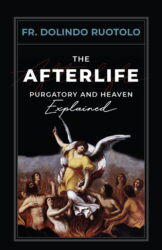Monsignor Francesco Cantelmo was a wayward priest. He was organized, capable, and intelligent, but had lost confidence in God and was, as Servant of God Don Dolindo writes in his autobiography, “in a deplorable state of spirit.” The skeptical priest no longer said the Breviary; in fact, he no longer prayed at all.
In 1909, Don Dolindo did not know about Msgr. Cantelmo’s loss of faith. But one night in late December, Dolindo arrived at Cantelmo’s door with a message for him: Gemma Galgani wanted to speak to him on behalf of Jesus.
This wasn’t the first time Dolindo had received a visit from St. Gemma since her death six years earlier, in 1903. At the beginning of 1909, Gemma had been Dolindo’s first visitor from heaven (His second was the angels, and the third was Jesus Himself). Back then, Dolindo had been fervently praying for heavenly assistance as he labored to extricate his relatives from the habit of holding séances, and Gemma had been sent to help him. After she intervened and spoke to Dolindo’s relatives through him, they converted and never again returned to the occult.
Now, Gemma had come to visit Dolindo again, this time with a message from Jesus for Monsignor Cantelmo—and for all wayward priests.
“Even the mystic Anne Catherine Emmerich said that when Jesus spoke to a person, though it seemed at first to be directed at one particular individual, He was actually addressing a whole group,” Don Dolindo explains in his autobiography. As he tells the story of Msgr. Cantelmo, Dolindo emphasizes that the messages Jesus gave to Cantelmo were not only for him but for all priests who have strayed from their vocation.
When he arrived at Msgr. Cantelmo’s door to tell him about his supernatural locutions, Dolindo wondered whether the cynical priest would believe him. But to his surprise, Cantelmo made the Sign of the Cross and felt that what he heard was the truth.
Usually, when Dolindo received communications from heaven, he was inspired to write them down, so Monsignor waited while Dolindo wrote the words that he received.
“Come, come, I must speak to You,” St. Gemma began, and then went on to address the specific, personal miseries that had contributed to the loss of Cantelmo’s priestly faith. “You are the one that Jesus wants to employ for His glory, for His honor,” she exhorted him. “But you are too distracted; it is necessary for you to recollect yourself better in prayer, in the presence of your God, the true source of all initiative and all activity. Yes, Jesus loves you so, so much, and it is He who wanted to call you, it is He who wants me to speak to you, because you are too dear to His heart. O Cantelmo,” (here Don Dolindo reminds us that Jesus always speaks to the wayward priesthood in the person of Cantelmo), “you are the pearl of my Heart; I watch over you.”
Then followed a long discourse regarding the many facets of conversion to which Jesus was calling Cantelmo.
“Lay the first foundation of your apostolate and yield to Me your freedom, your being, your life, your health, your intelligence, whatever you have, whatever you are. Yes, My beloved son, by yielding yourself to Me in a complete and unlimited way, you free My work of Mercy within you,” Jesus said through St. Gemma. “I pour into your heart the abundance of My mercies, and while you yield everything to Me and give Me freedom to devastate your heart with My infinite love, I yield Myself to you with My infinite gifts. Do you like the exchange?”
After revealing more about the necessity of self-denial, sacrifice, prayer, poverty, mortification, and love for God alone, Jesus called Cantelmo—and all wayward priests—to a singularly beautiful act of love and reparation: spending time with Him in the Blessed Sacrament.
“Prepare yourselves in silence, in recollection, in the mortification of your heart more than your body,” Jesus said. “I am more pleased with an affection, an act of love done with your repugnance and sorrow, than a hundred fasts. If you feel apathy in remaining before Me in the Blessed Sacrament, overcome yourselves; every extra moment that you linger there is then a crown, a preparation for new graces and new mercy.”
Transformed by this experience, Monsignor Cantelmo went to confession for the first time in a long time, and resolved to amend his life.
Two days later, Dolindo received another message for Cantelmo—this time not from Jesus’ representative, St. Gemma, but directly from Jesus Himself.
“Why did You come instead of Gemma?” Dolindo asked Him.
The reason was deeply moving: Jesus had come Himself because Cantelmo had broken his habit of apathy and made a fervent visit to the Blessed Sacrament.
“It is I, the same, because I must kiss my beloved son Cantelmo, he who in the uprightness of his heart has pleased Me,” Jesus responded. “Oh, with what a look of love I looked at him this evening when he was before Me in the Sacrament! With how much love I kissed him; with how much affection I pressed him to my Heart! Yes, yes, he has already opened the way to My Heart; I will make him feel My voice, I will make him experience My sweetness, My caresses.
“It is at My feet, in the Sacrament of Love, that saints are formed. It is here that the heart becomes pure, from the holy purity of the faith. It is here that the heart touches eternity in the hope of the eternal, and it is here that the heart is enkindled in the flame of love. It is in the Eucharist that the heart knows itself.”
With an effusion of love, Jesus encouraged Cantelmo and spoke of the boundless and infinite graces of His True Presence in the Eucharist.
“When I see you before Me, I bless you, I pour Myself into you, I embrace you, I kiss you, I press you to My Heart and I say to My Father: ‘Behold the jewel of My Eucharistic Heart.’ Oh, how dear to me is that heart which, like a burning lamp, consumes itself for Me and receives Me full of love!”
With these magnificent words, Jesus addresses not only Cantelmo but every priest like him. Every priest who has lost his fervor, lost his way, lost his faith, lost his prayer life, lost his hope; every priest who has abandoned the love he had at first (Rev 2:4), can hear these messages and know that Jesus is calling him to begin anew by yielding everything to His Eucharistic Heart.


Special thanks to Maria Palma Smith for the use of her English translation of the book Amore, Dolindo, Dolore (Casa Mariana Editrice “Apostolato Stampa”, 2001). Publication of the English translation is forthcoming from Academy of the Immaculate Publishing.
Special thanks also to Elie G. Dib for the use of his English translation of additional excerpts from Don Dolindo’s unabridged autobiography, Fui Chiamato Dolindo Che Significa Dolore (Apostolato Stampa, 1972).
Maura Roan McKeegan is the author of twelve Catholic picture books, including the award-winning Old and New series (Emmaus Road Publishing); Julia Greeley, Secret Angel to the Poor (Ignatius Press); and Seven Clues: A Catholic Treasure Hunt (Loyola Press), co-authored with Scott Hahn. She is also a contributor to various magazines. She writes about Servant of God Don Dolindo Ruotolo at her Substack site, Stories of Don Dolindo.

